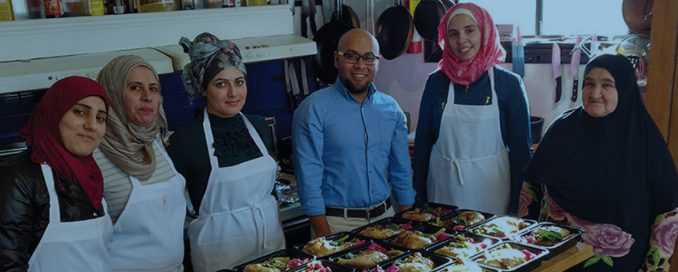Research Report Released on the Settlement of the Syrian Refugees in Ottawa
November 17, 2017Ottawa (November 21, 2017) – The Local Ottawa Local Immigration Partnership (OLIP) today released a research report titled: The Arrival and Settlement of Syrian Refugees in Ottawa – System Responses, Lessons Learned and Future Directions. With funding from Immigration, Refugees and Citizenship Canada, OLIP spearheaded this research initiative to create a common understanding of the successes and challenges of the community-wide effort to settle the Syrian refugees in Ottawa and learning from this experience.
In 2015 and 2016, more than 2,000 Syrian refugees arrived in Ottawa. Although refugees arrive in our city every year, this influx of a large number of refugees in a very short time period represented an exceptional situation. “There was a vast and varied network of agencies and organizations that had a hand in welcoming and settling Syrian refugees, and they crossed many sectors,” said Hindia Mohamoud, Director, OLIP. “The settlement sector was naturally key, but it was not alone; housing, education, employment, health and three levels of government were all involved.”
The research highlighted a large number of successes in the community response to Syrian refugees. “As part of Ottawa’s Syrian refugee response, there were excellent partnerships, an exceptional commitment and level of effort from service providers, even when funding and resources were not commensurate with the task,” adds Ms. Mohamoud.
Partnerships and collaborations criss-crossed this array of actors, including established collaboration tables and new relationships were formed. Many new practices and adaptation of existing services and programs took place in response to meet the unique needs of Syrian refugees, and the innovation and flexibility of service providers was noteworthy. The public response to the arrival of the refugees was overwhelming – more than $900,000 was raised locally and over 5,000 community members offered their help as volunteers.
There were challenges and important lessons that were learned, both from the successes and from the setbacks. The lessons learned, and the possible directions for the future flowing from them, were grouped into seven main areas in the research report:
- Strengthen collaboration capacity within and across sectors.
- Develop a local settlement and integration strategy that is focused on newcomer youth.
- Address service gaps and funding shortfalls
- Ensure equity and fairness in policies, programs, and investments.
- Improve the policy environment that governs supports for refugees.
- Leverage and strengthen community and public engagement.
- Undertake a complementary local research that documents the experience of the Syrian refugees in their first year of arrival in Ottawa.
To download a full copy of the research report, click here. A summary of the report is available here.
-30-
Contact:
Suzanne Charest, Communications Officer, OLIP
suzanne@olip-plio.ca
613-232-9634, ext. 318


 My nomination is an indication that our hard work in building Canada is recognized. All we do is to serve the community in return for embracing us when we needed it.
My nomination is an indication that our hard work in building Canada is recognized. All we do is to serve the community in return for embracing us when we needed it.

